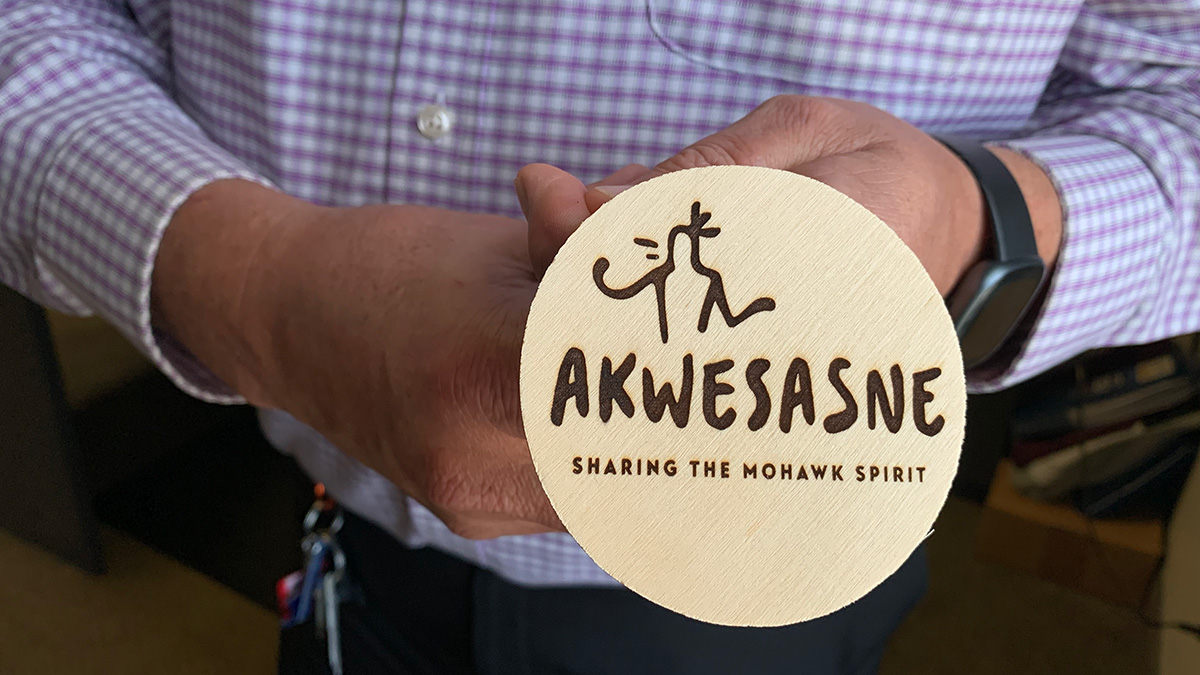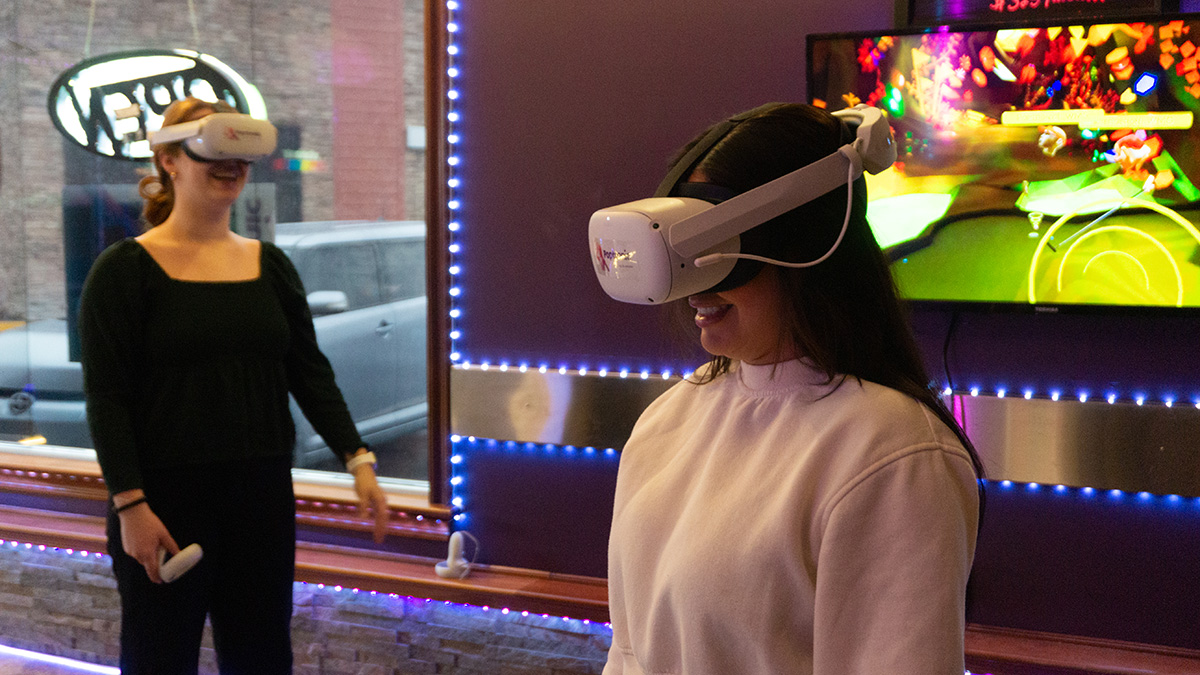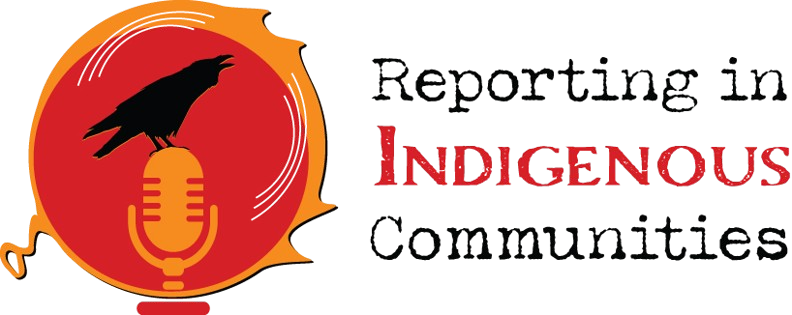
Edward Smoke is the business services specialist at the Office of Economic Development for the Saint Regis Mohawk Tribe and a hobbyist entrepreneur in his free time. [Photo © Catriona Koenig]
Reversing the “brain drain”: entrepreneurs find economic opportunities in Akwesasne
Small businesses like Poptronic and Hummingbird Gift Shop are helping reverse the brain drain in Akwesasne while navigating international borders.
By Catriona Koenig, Emma Weller, and Gabrielle Huston
Published in The Globe and Mail
In a room lit up with neon lights, eager teens put on headsets, ready to dive into pixelated alternate realities where anything seems possible.
Welcome to Poptronic – a virtual reality (VR) business located on Cornwall Island in the Mohawk Nation of Akwesasne.
After spending two years trying to grow their VR business in the city of Cornwall without success, owners Kelly Bergeron and Chatnie Herne decided to move to the neighbouring First Nation community.
“The difference is incredible,” Bergeron says. “We’ve been getting so much support.”
Businesses like Poptronic embody the Mohawk entrepreneurial spirit in Akwesasne, where more people are starting their own businesses and creating job opportunities for locals than average.

Journalist Catriona Koenig (left) joins Poptronic co-owner Chatnie Herne (right) for a round of virtual reality mini-golf. [Photo © Gabrielle Huston]
The explosion of entrepreneurs in Akwesasne
Akwesasne is unique, geographically: It intersects with Ontario, Quebec and New York State. Located in both Canada and the U.S., there are different governing bodies for each side of the border.
The total population of the territory is 23,000 people, with 11,000 on the U.S. side. According to Edward Smoke from the Office of Economic Development, run by the St. Regis Mohawk Tribe (New York State), more than 1,400 people are employed by nearly 360 small businesses on the American side.
That means St. Regis has considerably more small businesses per capita than the Canadian average.
Even Smoke has a side project making laser engravings on wooden key chains, which he often sells to a gift shop at a nearby historical site.
Smoke said the explosion in entrepreneurship is reversing the “brain drain” that plagued Akwesasne for years. Many remote and isolated First Nations experience brain drains, where people are forced to move to urban areas due to a lack of educational or employment opportunities. This “drains” the community of their knowledge and skills.
Now, in Akwesasne, more and more people like Chatnie Herne are bringing back their knowledge from postsecondary to help grow the community.
“I was always told if you go away for your education, bring that knowledge back to your community, because they supported you,” Herne says.
“They helped you get that. So, you should dedicate a portion of your work towards helping your community.”
Herne most recently graduated from the State University of New York College in Potsdam with a master of science in management of information technology.
She became the majority owner of Poptronic after Bergeron, an old co-worker and friend, brought her for her tech experience. Herne didn’t just leverage her technical knowledge, but her Indigenous culture and community knowledge to shape and grow the business.
This, combined with their move to Akwesasne, has paid dividends. In the last six months, Poptronic sales were double what they made throughout the two years they spent in Cornwall. Now, they have a space where they host birthday parties and other events. They are also trying to create partnerships with businesses to further Indigenous education.
Border hangups
While entrepreneurial spirits thrives in Akwesasne, business owners must work around the challenge of being subject to three jurisdictions.
The international border that divides the territory has both benefits and disadvantages for small businesses on either side.
Hummingbird Gift Shop is located on the Canadian side, right after the Seaway International Bridge, in the same plaza as Poptronic.
“We do depend on people outside of the community to purchase our products in order to be successful,” says Luz Benedict, a co-owner of the gift shop. “We definitely wouldn’t be able to survive as a business if we didn’t have visitors from off-reserve.”
She adds that around half of their sales come from non-residents on their way to cross the U.S. border.
Despite getting business from curious travellers, other potential customers are often deferred from making the trip. To get to Cornwall Island, people must pay a toll to cross the bridge.
When leaving the island, it’s required to cross through Canadian customs, even though visitors don’t leave the country. This can mean waiting in line at the border and potentially fielding stressful questions from the customs officer.
“It can make people nervous,” Luz Benedict says. “And it’s an extra hassle.”
To eliminate “the restrictions of the customs and the toll booths,” Hummingbird’s goal for the year is to set up an online storefront.
Luz Benedict and her partner, Jason Roundpoint, both left the community to attend university, but returned from Cornell University and St. Lawrence University, respectively, bringing back their knowledge and skills to open Hummingbird and their adjacent business, Peacetree Moccasins.
“I was always planning to be back,” she says.

Poptronic co-owner Kelly Bergeron sits in front of the Poptronic mural in their front-of-house. [Photo © Gabrielle Huston]
‘It’s a dream come true’
Ontario Regional Chief Abram Benedict, who has been the Grand Chief of Akwesasne for the past nine years, says that “there are some real innovative people coming out of college and universities.”
“[They’re] taking on the traditional challenges of business development, and then really pushing hard, and we’re seeing a lot of positive results.”
At Poptronic, Bergeron says, “the future is looking pretty cool.” She and Herne continue to relentlessly apply for grants. They’re hoping to expand their virtual reality space, so they can take on more opportunities.
“It’s exactly what I wanted to do,” Herne says. “To come back and do something that I love and incorporate the culture and tech … it’s a dream come true.”
